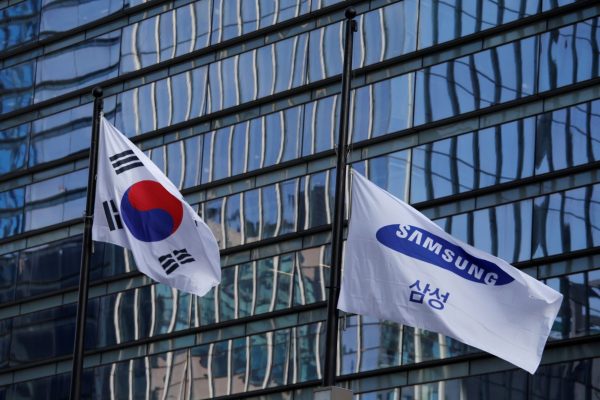The chaebol are large family-run conglomerates that were instrumental in South Korea’s industrialisation from the 1960s. They were subordinate to the state through credit allocation until the liberalisation of the early 1990s, when they became transnational corporations. Despite their global reach, their corporate structure remains family based.
Powerful chaebol families use complex cross-shareholdings, circular shareholding and inheritance of management rights to maintain control over the conglomerates. They have long resisted reforms, using their weight over South Korea’s GDP (over 80 per cent) to prevent any forceful government change.
The control that chaebol families have over the conglomerates creates fertile ground for state–business collusion. Indeed, the scandals that led to the impeachment of former South Korean president Park Geun-hye involved bribes received by Park’s confident, Choi Soon-sil, from Samsung. Lee Kun-hee’s son, Lee Jae-yong, was arrested for corruption, but he was released from jail in 2018.
This seems to confirm what large segments of the South Korean public decry: South Korean magistrates are relatively lenient with the chaebol. South Koreans often call their country ‘the Samsung Republic’ — they both admire the national accomplishments of the chaebol and lament their dominance over the country’s economy.
South Koreans are increasingly frustrated by the unequal access to socio-economic opportunities the chaebol have come to represent. In the wake of the candlelight protests against Park Geun-hye, many talked about a return to the dynastic social hierarchy of the Choson-era. South Korean society is increasingly polarised in terms of income but also in access to education, employment and real estate.
South Korea’s Gini index has been rising since the 1997 Asian financial crisis, reaching 0.304 in 2016, and labour is increasingly precarious. The chaebol have been concentrating wealth, while small and medium enterprises often struggle.
Successive governments have been aware of this concentration of income and opportunities, and of the unfair business practices used by the conglomerates. Every liberal president promises to reform the chaebol. Liberal academics and business people see the chaebol structure as detrimental to innovation. Chaebol reform has also long been demanded by civil society activists.
In 1980, the Monopoly Regulation and Fair Trade Act banned direct cross-shareholdings among companies that belonged to the same group. It also limited equity investments and reciprocal debt guarantees. Former South Korean president Kim Dae-jung had plans for chaebol reform to build on the Act, but this was jeopardised by the 1997 financial crisis.
The Kim government managed to appoint external directors to the chaebol, who could demand compulsory consolidated financial statements and attach legal liabilities to the position of chairman. But it did not curb family dominance. The conservative government of former South Korean president Lee Myung-bak abolished the total equity investment ceiling system and strengthened the concentration of chaebol economic power.
South Korean President Moon Jae-in appointed Kim Sang-jo, an academic who has long advocated chaebol reform, Chairman of the Fair Trade Commission.
For the Moon administration, chaebol reforms must address a number of issues. Reforms must improve minority shareholders’ rights and ability to nominate board members and improve corporate decisions. They must separate financial and industrial capital and strengthen the separation of ownership from management. And they must also put an end to circular shareholding practices that allow chaebol families to control an entire conglomerate without owning a majority of the shares.
It is likely that activists and critics of the chaebol will use Lee Kun-hee’s death as an opportunity to push for reforms. So far civil society organisations have been disappointed with the Moon administration’s chaebol policies. In 2018, the largest South Korean trade union, the Korean Confederation of Trade Unions, together with the Korean Metal Workers’ Union, called for a general strike to demand chaebol reform. Despite this pressure, it is unlikely that Lee’s death will make the task of chaebol reform easier.
Lee Jae-yong, Samsung’s heir, has been building up his dominance over Samsung since his father suffered a heart attack in 2014. He was arrested in 2017 on charges of corruption and he currently faces charges of fraud for the controversial 2015 merger deal between Cheil and Samsung CT. He is accused of making a fraudulent deal to ensure his control over the conglomerate. All this suggests that Lee Jae-yong is not reform-minded.
The Moon government plans to implement chaebol reform despite the ongoing pandemic. This summer it approved revisions to the Commercial and Fair Trade Act before passing the bills on to the National Assembly. The new legislation introduces a multi-representative litigation system, allowing minority shareholders of a parent company to file a suit against executives of a subsidiary.
The legislation would also introduce outside auditors to chaebol governance. Companies would need to separately select a minimum of one committee member external to the board. The largest shareholders’ voting rights will also be limited to 3 per cent.
Despite these legislative moves, circumstances are not favourable for chaebol reform. Despite Moon’s ambitious post-COVID-19 , the South Korean economy is still dependent on the chaebol for economic growth.
In a difficult economic context, government critics — including the business community — will surely see chaebol reform as secondary to economic growth. Chaebol reform now seems risky as the pandemic has made Samsung, through its affiliate Samsung Biologics, stronger. South Korea’s economy is more dependent on the chaebol than ever.
Juliette Schwak is Assistant Professor of International Relations and Political Science at Franklin University Switzerland.

